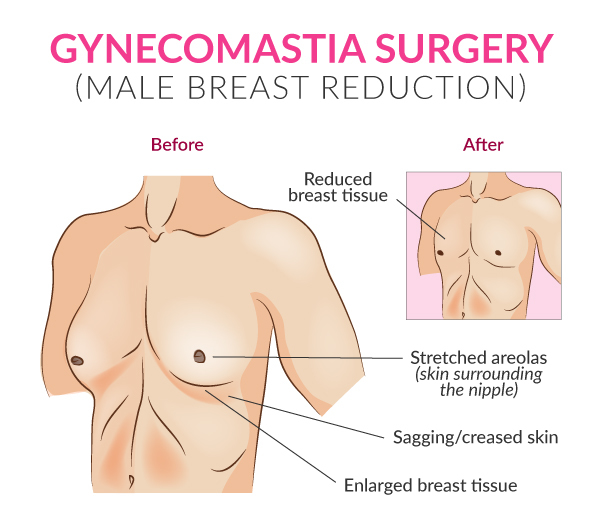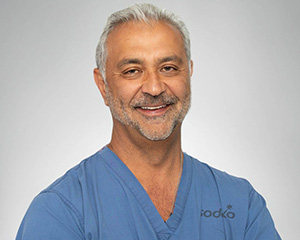Gynecomastia: Everything You Need to Know About Enlarged Breasts in Men
First of all, what is gynecomastia? This condition occurs when there’s an increase in the amount of breast gland tissue in both boys and men. This increase is due to an imbalance of the hormones estrogen and testosterone. It can affect one or both breasts and is not responsive to diet or exercise.
Let’s discuss how common gynecomastia is, how to tell if you have it, the causes behind it, the treatments for it, and whether you should consider surgery or not.
Page Topics
How Common is Gyno or Gynecomastia?
Gynecomastia is a very common disorder in men. It affects around 50%-65% of all boys and men worldwide. It’s particularly common in older and middle-aged men, as well as boys going through puberty, due to the natural hormonal changes that occur during that time.
How Does Gynecomastia Affect My Body?
Gynecomastia increases the amount of glandular tissue in your breasts. This can cause the appearance of “man boobs” in either one or both breasts and can often cause unevenness in them.
How Do I Know if I Have Gynecomastia or Just Chest Fat?
When trying to decide if you have gynecomastia or just chest fat, there are a couple of questions that you need to ask yourself.
What’s My Age?
If you’re younger and have yet to go through puberty, or are going through puberty, then the excess tissue or fat on your chest could be due to your age. During this time, gynecomastia is something that time will cure as your hormones work themselves out. Your chest will typically flatten by the ages of 15 or 16.
Additionally, older men may obtain excess breast tissue later in life due to the natural drop in testosterone.
Do I Have Excess Body Fat?
If you have excess body fat everywhere on your body, then the additional fat on your breasts may not be due to gynecomastia. There can be body composition tests performed to determine your body’s fat percentage. Even those who are on the trimmer side can have a low proportion of muscle and an elevated body fat percentage, which can settle into the breasts.
An indication of this can be your cholesterol and triglyceride levels. If, in your blood tests, there are high triglycerides, low HDL cholesterol, and/or high LDL cholesterol, this can be a sign of a higher percentage of body fat.
Do I Have a Medical Condition?
Gynecomastia can be an effect of certain medical conditions that are usually linked to hormone levels. For example, an overactive thyroid or adrenal gland cancer can create a hormone imbalance that can link to excess breast tissue.
Have I Had My Hormones Checked Recently?
In many cases, hormone imbalances can often go undetected in both men and women. If you suspect that you may have a lack of testosterone, excess estrogen, or other hormone-related issues that could be causing your gynecomastia, there is a lab test that can be performed to check.
What’s My Diet Like?
If you have a higher percentage of body fat, even within the healthy weight range, this can cause excess tissue to form in the chest.
A higher percentage of body fat is typically due to a poor diet. A healthy diet should consist of proteins, whole grains, vegetables, fruits, and healthy fats and oils.
How Often Do I Exercise?
Exercise, specifically strength training, can assist in defining your pectoral muscles and make excess fat and tissue less noticeable. If your strength training or exercise is not affecting your excess breast tissue and fat, or it’s making it appear more pronounced, then Gynecomastia is likely.
Do I Drink Alcohol Frequently or Use Substances?
Excess alcohol use, as well as the use of substances like opioids, marijuana, and amphetamines, can be linked to gynecomastia.
![How to tell if you have Gyno - Classification of Gynecomastia [Gyno] classification-of-gynecomastia](https://drmazaheri.com/wp-content/uploads/2020/05/classification-of-gynecomastia-dr-mazaheri.jpg)
Understanding the Symptoms and Causes of Gynecomastia
What Are the Signs and Symptoms of Gyno?
The symptoms of gyno/gynecomastia can include:
- Pain
- Swollen breast tissue
- Tender breasts
- Sensitive nipples when they rub against clothes
If you experience these more serious symptoms of gynecomastia, you should see your doctor as soon as possible:
- A firm or hard lump
- Dimpled skin on the breast
- Fluid coming out of one or both breast nipples
What Causes Gynecomastia?
Gynecomastia, or “man boobs,” can have a variety of causes, all with different treatment options.
Natural Hormone Changes
Gynecomastia can be a result of natural changes in testosterone and estrogen. Typically, it’s caused when the estrogen levels are too high or out of balance with the testosterone.
These natural hormone changes can cause gynecomastia in infants, boys going through puberty, and older men.
Medicines
Gynecomastia/Gyno can be caused by certain medications, like:
- Anti-androgens, including flutamide, finasteride, and spironolactone
- Antiretroviral medications, sometimes used to treat HIV
- Anabolic steroids and androgens that treat delayed puberty or muscle loss
- Tricyclic antidepressants
- ADHD medications that contain amphetamines, like Adderall
- Anti-anxiety medications, including diazepam
- Opioids to treat chronic pain
- Chemotherapy to treat cancer
- Some antibiotics
- Ulcer medications, like cimetidine and omeprazole
- Stomach-emptying medications, such as metoclopramide
- Heart medications, like digoxin and calcium channel blockers
Recreational Drugs, Illegal Drugs, Steroids, and Alcohol
Substances that can cause gynecomastia are as follows:
- Methadone
- Amphetamines
- Alcohol
- Marijuana
- Anabolic steroids
- Heroin
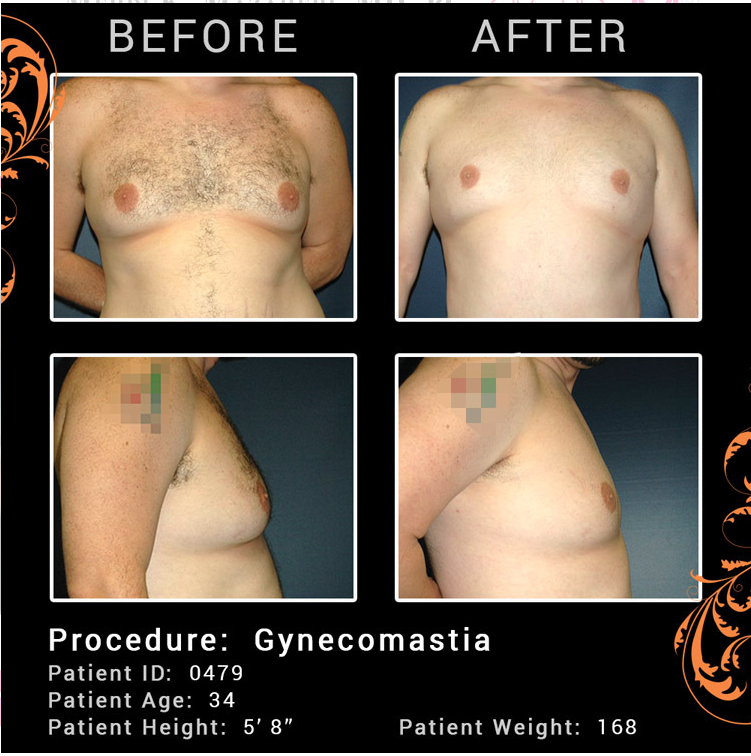
Health Conditions
There are certain health conditions that can influence the balance of hormones and can be linked to gynecomastia.
They include:
- Tumors
- Aging
- Hypogonadism
- Hyperthyroidism
- Liver failure and cirrhosis
- Kidney failure
- Malnutrition and starvation
How Can I Check Myself For Gynecomastia[Gyno]?
What is the Gynecomastia Pinch Test?
The best way to check yourself for gynecomastia/gyno is the pinch test. This involves lightly palpating the area surrounding and beneath the nipple. The area may feel tender and uncomfortable, though this is not always the case.
You will be looking for a small, firm lump that is generally located directly beneath the nipple. It will feel like a disk that radiates out in small concentric circles beneath the nipple. There may be a lump present on one or both breasts and they are usually the size of a button, as well as slightly mobile.
Is Gynecomastia Painful to Touch?
Gynecomastia may be painful to touch to some, and not to others. Many patients notice tenderness or discomfort surrounding the nipples when the area is touched.
How Gynecomastia is Diagnosed
Gynecomastia is typically diagnosed by a physician who discusses your past health and medical history and gives a physical exam.
You may also be tested to rule out other conditions or diseases. These tests could include:
- Urine tests
- A low-dose X-ray of your breast
- Blood tests, including hormone and liver function tests
- A small breast tissue sample could be removed and checked for cancer cells
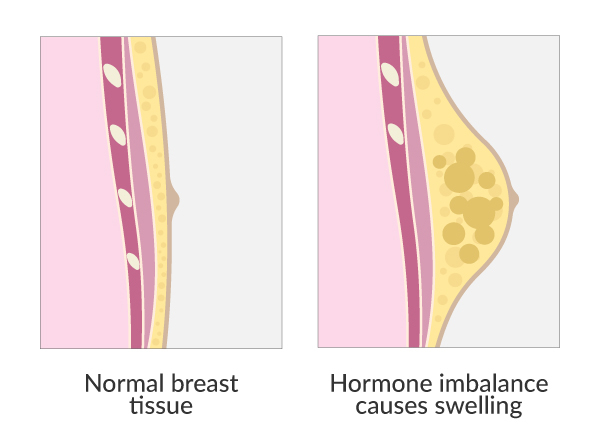
Treatment For Gynecomastia
Treatments for Gynecomastia can vary. It will depend on:
- How old you are
- Your overall health and past health
- How sick you are
- How well you handle certain medicines, therapies, or treatments
- How long the condition is expected to last
- Your preference
If medications are causing your Gynecomastia, you may need to stop the medication. If an underlying disease is causing the breast enlargement, that disease will need to be treated. Hormone therapy can be used to treat Gynecomastia/Gyno as well.
In more severe cases, surgery is available to remove the extra tissue.
Who Should Consider Male Breast Reduction Surgery?
Male breast reduction surgery should be considered under the following circumstances:
- Your breast development has already stabilized
- The size of your breasts is physically uncomfortable
- Alternative corrective treatments are not an option
- You have self-image issues due to the Gynecomastia and have specific body goals in mind
- You are physically well enough for surgery and have no conditions that could impair recovery
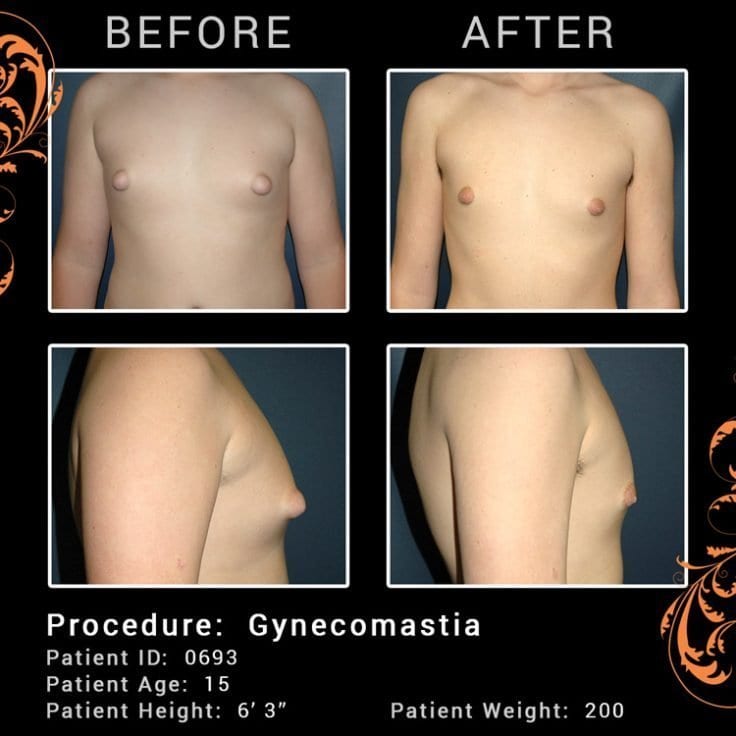
Schedule a Consultation With Expert Plastic Surgeon, Dr. Mazaheri
If you’re interested in a Gynecomastia procedure or want to learn about it, schedule a consultation with the premier board-certified plastic surgeon in Scottsdale, Dr. Mazaheri. He will discuss the process and all of your options during your consultation, and answer any questions you have. He will be there to assist you every step of the way through your procedure and recovery.
Read our Gynecomastia Surgery Recovery Guide <- Here!
Frequently Asked Questions about Gynecomastia:
Can Man Boobs Go Away on Their Own?
Gynecomastia will typically go away in teens on its own. Other cases may require lifestyle changes, therapies, or surgery.
How Can I Lose My Man Boobs Fast?
No matter the reason for your gynecomastia, getting rid of man boobs will be a process.
Can Gynecomastia Be Life-Threatening?
Gynecomastia is not life-threatening, though some rare underlying conditions that cause it may be.
Does Having Gyno Mean I Have Low Testosterone?
Gynecomastia typically due to low testosterone levels or an imbalance of hormones.
What Are the Complications of Gynecomastia?
If Gynecomastia isn’t treated, the enlarged breast tissue can continue to expand and cause more discomfort.
How Much Does Gynecomastia Surgery Cost?
The average gynecomastia surgery can cost anywhere from $6,500 to $8,000, depending on various factors.
Does Gynco Affect Bodybuilding?
Those who bodybuild with the supplement of anabolic steroids will often struggle with gynecomastia.
Does Lifting Make Gyno Worse?
Lifting can make your gynecomastia more noticeable when you lift, as the muscles push the tissue out.
Comments are closed.

